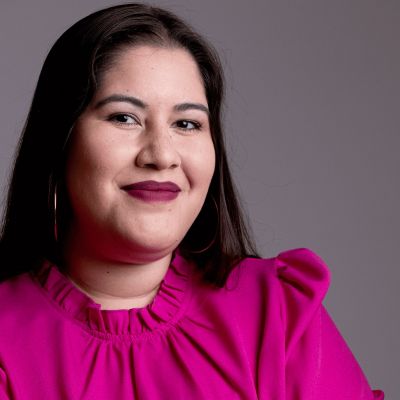
Dr. Liliana Guerrero
Butler School of Music.
University of Texas, Austin
Austin, Texas
During Dr. Liliana Guerrero’s year as a Teaching Artist for the Austin Opera, she went to local elementary schools to introduce students to the concept of opera by telling them stories, singing some arias and explaining the artform. The program was well-received, but she wanted to make it available to a larger audience. “Austin is known as the ‘live music capital of the world,’ but we have what I call ‘arts deserts,” she explains. “Some communities in our larger metropolitan area don’t have access to quality children’s music programming.”
Guerrero and a colleague wrote a grant proposal and secured over $14,000 in funding to start Meet the Opera, a free six-week series of workshops for kids, presented at local libraries, that teach them about opera. “We were able to serve hundreds of children by bringing the magic of opera from downtown to right around the corner,” she says.
Kids were able to make sounds on tubas, create props, and learn choreographed songs and dances. “As a child of immigrants, I didn’t know what opera was, and I didn’t have access to it as a child,” she explains. “I knew that if kids could see someone who looked like them doing this type of music, they would fall in love. And they did! We’ll be back at the library this summer, and I can’t wait.”
The University of Texas — Austin is a Hispanic-serving institution, and Guerrero takes her mentoring responsibilities very seriously. “Latinas make up 1% of all full-time college faculty in the United States,” the Assistant Professor of Voice says. “I am often the only in the room – the only woman, the only Latina, the only young person. It is my duty to show my students how to move in spaces they’ve never been in with dignity, grace and compassion. I am honored to connect with my students who have similar backgrounds, especially those of us who are ‘culture straddlers,’ known in Spanish as ‘ni de aquí, ni de allá.’”
Guerrero is passionate about the intersection of music and social justice. Around 2017, she co-founded a grassroots performing arts collective in Chicago that focused on themed fundraising concerts. “We raised money for organizations including Chicago Books to Women in Prison, Chicago NOW and Girl Forward. I believe in the power of music to affect change, and I believe that the music of our time tells us the story of who we are,” she says proudly.
She regularly commissions and premieres works by marginalized composers so her students can feel seen and heard in their music education curriculum. “My students are Black and brown and queer and trans, and I want them to see that they have a place in this story,” she exclaims. “It’s essential to me that I lead by example, that I lift while I climb, and that my students feel empowered by the stories we highlight in the classroom.”
As a result, Guerrero has presented clinics nationally on how to use music to create civic engagement opportunities for students. “This spring I will be recording my debut album and the repertoire is all music by Latinas, including a commission for my grandmother,” she says. “You can’t be what you can’t see!”








